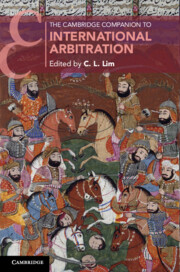Book contents
- The Cambridge Companion to International Arbitration
- Cambridge Companions to Law
- The Cambridge Companion to International Arbitration
- Copyright page
- Dedication
- Contents
- Contributors
- Foreword
- Preface
- Treaties, National Legislation, Cases and Awards
- Part I The History, Doctrines and Sociology of the Growth of Transnational Justice
- Part II International Commercial Arbitration as a Transnational Justice System
- Part III Investor-State Arbitration
- Part IV Inter-State Arbitration and the Pursuit of Peace
- 14 Arbitration and World Peace
- 15 Inter-State Arbitration
- 16 The Permanent Court of Arbitration
- Part V Systemic, Trans-Substantive and New Issues
- Index
14 - Arbitration and World Peace
from Part IV - Inter-State Arbitration and the Pursuit of Peace
Published online by Cambridge University Press: 08 October 2021
- The Cambridge Companion to International Arbitration
- Cambridge Companions to Law
- The Cambridge Companion to International Arbitration
- Copyright page
- Dedication
- Contents
- Contributors
- Foreword
- Preface
- Treaties, National Legislation, Cases and Awards
- Part I The History, Doctrines and Sociology of the Growth of Transnational Justice
- Part II International Commercial Arbitration as a Transnational Justice System
- Part III Investor-State Arbitration
- Part IV Inter-State Arbitration and the Pursuit of Peace
- 14 Arbitration and World Peace
- 15 Inter-State Arbitration
- 16 The Permanent Court of Arbitration
- Part V Systemic, Trans-Substantive and New Issues
- Index
Summary
It is a truth universally acknowledged – or at least it should be1 – that the importance of arbitration between States extends beyond the subject matter of the arbitrations themselves and has wider implications for the peace of the world. The idea that wars can be avoided if States have access to peaceful means of settling the disputes which might lead to war has played an important part in international relations for at least 150 years. Yet it is an idea which has waxed and waned in popularity. Its apogee was in the last decades of the nineteenth century and the first years of the twentieth. At that time there were many – by no means all of them international lawyers – who saw international arbitration as one of the principal instruments for preserving the peace.2 That idealism waned after the World War I.
- Type
- Chapter
- Information
- The Cambridge Companion to International Arbitration , pp. 309 - 325Publisher: Cambridge University PressPrint publication year: 2021
- 2
- Cited by

